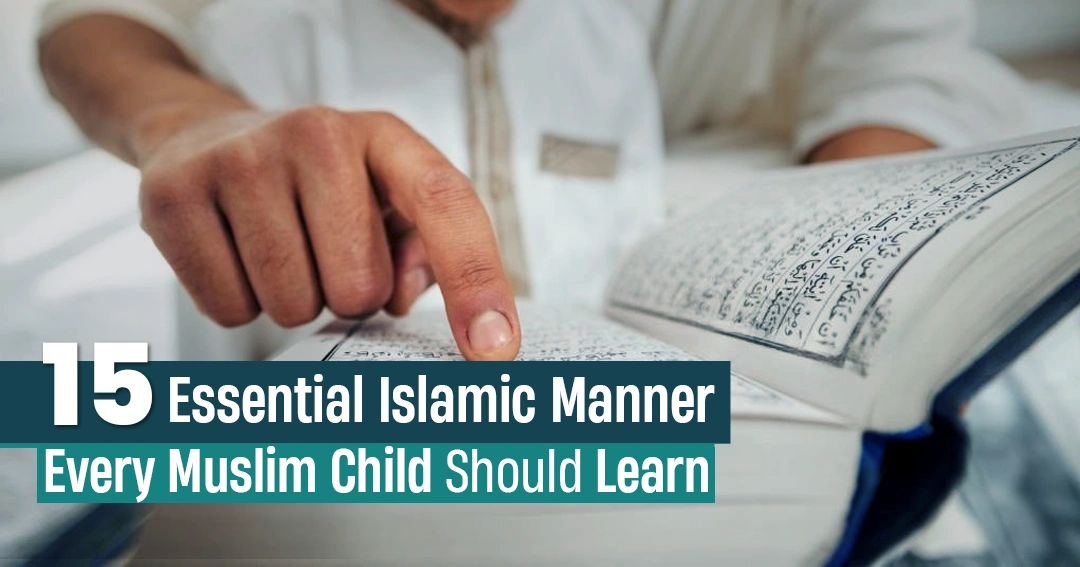Islamic manners for children are the keystone to bringing up mannered, compassionate, and spiritually conscious young Muslims.
Instilling good manners in kids isn’t merely about social conduct, it’s about cultivating their relationship with Allah and encouraging them to follow the Sunnah of the Prophet Muhammad ﷺ. This article will discuss 15 simple manners every Muslim kid should know, and so much more.
Why Teaching Islamic Manners to Children Matters

Here is why it is essential to teach Islamic manners for kids:
Building a Strong Islamic Foundation at an Early Age
Teaching Islamic manners for children is not just about encouraging polite behavior, it’s about laying the groundwork for a child’s relationship with Islam that will last their entire life.
If children are taught how to behave according to Islamic instructions, they develop a better understanding of their faith, identity, and morality. Good manners become instinctive to them, shaping the way they interact with other individuals and the way they perceive the world around them.
Good Manners Manifest Good Faith
In Islam, there is no difference between manners (Adab) and religion, they are reflective of it. The Prophet Muhammad (peace be upon him) emphasized the importance of good character and said,
“Nothing is heavier on the Scale of Deeds than one’s good manners” (Tirmidhi).
Islamic manners for children enable them to connect their everyday activities to their religion, and being kind, honest, and respectful as acts of worship.
Parents and teachers can also cooperate with Tareequl Jannah Academy to make sure that children adopt the right Islamic outlook behind each method they acquire.
Islamic Manners for Children Prepares Children for Positive Social Interaction
Children who are raised with good Islamic manners for children are likely to develop respectful and close relationships. At home, at school, or in society, Islamic etiquette teaches children how to speak respectfully, how to terminate disagreement amicably, and how to uphold other individuals’ rights.
Such interpersonal skills are not only consistent with the Sunnah but also ensure them success in all areas of their lives.
Establishing a Legacy of Sound Character
Educating Islamic manners for children is an investment that will reap rewards years down the road. Properly mannered children grow into moral adults who are an asset to society and who provide a good example for the next generation.
As parents and students, your leadership today can leave a legacy of religion, dignity, and kindness.
Enroll your child in the well-established programs by Tareequl Jannah Academy, where instilling good manners is but one facet of a greater objective of raising educated and righteous Muslims.
15 Essential Islamic Manners for Children

Developing good character begins with habits. Educating Islamic manners for children provides them with the tools to lead a life that is led by faith, mercy, and discipline. Following are 15 must-know manners for every Muslim child that are founded upon Islamic teachings and easy enough to apply in real life.
1. Reciting Bismillah Before Doing Anything
Children need to be taught to begin activities like eating, writing, or entering a room by pronouncing “Bismillah.” This small reminder keeps them aware that everything has to be initiated with the name of Allah.
2. Salam while greeting (Assalamu Alaikum)
One of the most popular Islamic manners for children is to greet people with Assalamu Alaikum. It fosters peace, unity, and respect among Muslims. Learning this habit at an early age enables kids to practice kindness and Islamic brotherhood in their daily lives.
3. Respect towards Parents and Elders
Respect for parents forms one of the pillars of Islam’s teachings. Children should be instructed to listen, obey, and speak respectfully to their parents and elders. This basic Islamic manners for children reflect the focus in Islam on obedience and appreciation.
4. Speaking Kindly and Truthfully
Islam instructs Muslims to utter something good or remain silent. Training children to avoid coarse words, falsehood, or rumors sets the foundations of honesty and mercy. Such qualities are consistently encouraged in Tareequl Jannah Academy’s character studies lessons.
5. Reciting Alhamdulillah and Other Daily Duas
Expressing gratitude and thanking Allah after blessings like food or good news should come naturally. Phrases like Alhamdulillah, SubhanAllah, and InshaAllah teach children to be thankful and have faith in Allah, two of the most essential elements of Islamic manners for children.
6. Knocking Before Entering a Room
Respecting other individuals’ privacy is an Islamic manner. Children must be taught to knock and wait before entering a room. This not only builds manners but also instills respect for boundaries and tact.
7. Drinking and Eating with the Right Hand
The Prophet Muhammad (PBUH) always ate and drank with his right hand. This Islamic manners for children is a Sunnah act that is an easy yet effective habit to impart, teaching children that doing simple things with purpose can be a form of worship.
8. Thanking Allah and Others (Saying JazakAllah Khair)
Saying JazakAllah Khair helps kids learn to be thankful in Islam. This approach makes social bonds stronger and helps kids remember that thanking is a good action in Islam.
9. Honesty and Trustworthiness
Honest children who are also reliable are valued by society and religion too. Islamic manners for children includes being honest and true to one’s word, as was Prophet Muhammad, who was also called Al-Amin (the trusted one).
10. Lowering the Gaze and Modesty Habits
Islam encourages modesty and dressing habits for both boys and girls. Educate children on how to dress modestly, act modestly, and look down when the situation calls for it. This educates them that modesty is a strength, not a weakness.
11. Helping Others and Empathy
Deeds of charity, such as helping a fellow pupil or taking care of a neighbor’s pet, are generously rewarded in Islam. Emulating kindness by serving in the workplace is a beautiful way to raise children’s empathy and generosity and teach Islamic manners for children.
12. Treating Teachers and Scholars with Respect
The second important Islamic manners for children is respect for knowledge and bearers of knowledge. Showing respect to teachers encourages humility and encourages children to take education seriously.
13. Love for the Environment and Cleanliness
Purity is half of piety (At-Tahuru Shatru Al-Iman). The children should be instilled with the practice to clean themselves, their homes, and their environment. From washing hands to collecting rubbish, all little things contribute.
14. Islamic Manners for Children: Avoid Backbiting and Profanity
Teach children to avoid gossiping behind someone’s back or using obscene language. Such behavior goes against Islamic etiquette in spirit and damages relationships. Good speech guarantees that children remain in a clean heart and mind.
15. Humility and Steer Clear of Arrogance
Islam teaches humility. Children must learn that they should never boast, brag, or degrade others. It is an effective way to make children humble by teaching them that all human beings are deserving of respect in the eyes of Allah.
Tips to teach Islamic manners to kids

Teaching Islamic manners for children need not be troublesome. With patience, consistency, and adequate material, parents and teachers can create a lasting impression. A few helpful tips on how to navigate your child’s Islamic character development effortlessly and affectionately are outlined below:
1. Lead by Example Every Day
Children are imitators by nature. They notice the manner in which you speak, behave, and react. If you consistently practice good etiquettes, say Bismillah before meals, or say Assalamu Alaikum when meeting people, the child will automatically learn these.
Displaying Islamic manners for children is the most effective way of teaching them without even needing to deliver lengthy speeches.
2. Use Soft Reminders, Not Harsh Corrections
When a child forgets a way, gently correct them. Use phrases such as, “Let’s do it again the Sunnah way,” or “How are we supposed to say thank you before we eat?”
Gentle reminders help remind children of good behavior without instilling fear or resistance. This comes in line with how Tareequl Jannah Academy raises their students in a supportive environment.
3. Make Learning Fun and Interactive
Kids learn best if learning is fun. Translate Islamic manners for children into play, songs, or a story.
For example, conduct a “Salaam Challenge” and see who says “Salaam” to most people a day or create a chart where children receive stars for saying respectful words. Islamic manners for children learned through play are more memorable.
4. Link Manners to the Example of the Prophet
Tell your children that they are following the example of Prophet Muhammad (peace be upon him) when they are being good mannered. Tell them short stories or Hadiths about his character. This helps children feel closer to what they are doing and solidifies their affection for the Prophet.
5. Praise and Motivate Honest Effort
Positive reinforcement is magic. When your child makes a conscious effort to say Alhamdulillah or knock before entering, be sure to praise them. A mere “MashaAllah, very respectful!” encourages children to continue practicing.
Encouragement of even minor attempts grows confidence and commitment towards Islamic manners for children.
6. Establish a Consistent Home Environment
Consistency is everything. If you pay attention to manners sporadically, it gets confusing for children. Create house rules based on Islamic manners for children, like always greeting when coming in the door, not interrupting others, and thanking others sincerely. The more regular the home life, the more second nature good manners will be.
If you found this article useful don’t forget to share it with your friends and family.
Help Your Child Grow with Beautiful Islamic Manners
Looking for practical ways to raise well-mannered, confident Muslim children? Explore our enriching collection of articles designed to teach kids the essential Islamic values every young Muslim should know.
From learning Islamic manners for children and building strong Islamic character, to mastering Islamic hygiene rules and masjid etiquette, each article is crafted to make Islamic teachings simple, relatable, and engaging for kids.
Plus, don’t miss the timeless wisdom of the Prophet ﷺ in our guide on Prophet Muhammad stories about manners for kids, and help your child learn the rights of neighbors in Islam and the proper Islamic way of speaking with love and respect.
Start reading now and guide your child toward becoming a well-rounded Muslim with beautiful adab and character.





